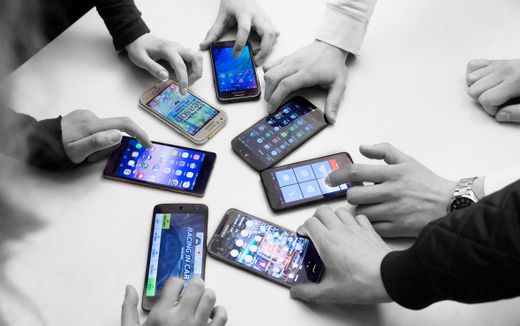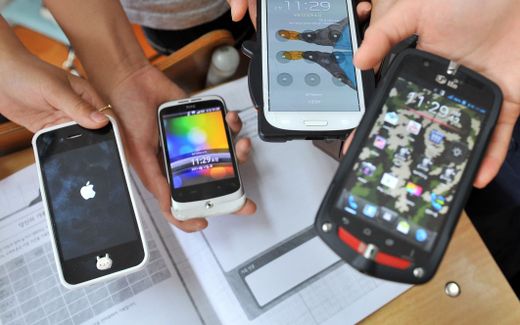Chased by constant stream of notifications

People taking photos with their smartphone. Photo EPA, Reba Saldanha
Christian Life
We must be constantly available in modern society. Our smartphone enables others to reach us at all times. Sometimes, that is handy. However, it also has another side: more and more people experience stress. It can even lead to a digital burn-out. How can we avoid this?
The German Clara Hahn could not go a moment without her smartphone. Ten minutes of not checking your cell phone? Impossible for her. Even when she was watching her three-year-old daughter fall asleep, she could not resist the temptation of checking her messages. Not until her own daughter accused her of this did she realise her addiction. After that discovery, she decided to live with an old Nokia cell phone. PRO writes this story, based on an article in the German weekly Die Zeit, as an example of how quickly a smartphone can overtake our whole life.
After she put away her smartphone, Hahn experienced real withdrawal symptoms. She lived in constant fear of missing something and reached in her pocket several times a day, in vain.
Nowadays, Hahn is the head of a coaching agency in Berlin. She notices that people are “constantly on alert.” Breaking news, push notifications, and message notifications are constantly sent to us and demand an immediate response, she says. That constant stream of stimuli can lead to permanent stress.
Research on digital stress
Research shows that addiction to smartphones and the resulting stress thereof is not rare. The VOCER Institute for Digital Resilience in Hamburg discovered that 39 per cent of 14-29-year-olds say that social media impacts their psychological well-being, be it positively or negatively. About 49 per cent of this age group indicated that being constantly available via digital devices causes stress. The researchers questioned 1,000 Germans on thirty aspects of their digital media use. They also interviewed 60 people of various ages and backgrounds in depth.
In addition, more than 80 per cent of all examined age groups said that fake news and disinformation are significant problems. Almost all of them also complained about the hate and subjectivity used in discussions on social media.
A large part of the German population is also tired of the news, especially during this time of crisis. At the beginning of the Covid pandemic, the interest in news grew, but now people get stressed out by it. A fifth of the respondents to the survey indicated that they have read less news since the start of the pandemic because it causes them too much stress.
The study concludes that older people are less likely to be overwhelmed by digital devices and social media. The researchers explain this by pointing out that these people know relatively well how to use the media in a targeted manner and are less likely to be influenced by a “fear of missing out”, which is quite common among younger people.
The fact that half of the 14-29-year-olds experience stress from cell phone use is concerning, says Leif Kramp, research coordinator at the Center for Media, Communication and Information Research at the University of Bremen. “Mainly because it is assumed that in this age group, considered the “digital natives”, people know how to use digital media responsibly.”
Pawn
Reality seems to be the opposite of this expectation. Young people have been socialised with digital media since childhood and let it influence them. Kramp sees that many young people lack digital resilience, which is the “great key competence of the present”.
Resilience means having a mental and psychological resistance against specific stress triggers, says Markus Steffens to PRO. He is a professor of Social Medicine and Chief Physician for Psychiatry and Psychotherapy at the Hohe Mark Clinic. People can check their digital resilience, or rather the lack thereof, for example, if they notice that they become a “pawn” of certain apps, such as Instagram or TikTok. These social media apps suggest new content to users, which makes it hard to stop scrolling. According to Steffens, it is hard to reduce consumption without removing the apps altogether.
Disorders
A lack of digital resilience can lead to physical symptoms, says Steffens. They can range from sleep disorders, fears, eating disorders and excessive alcohol consumption. Media use can lead to stress but also to digital burnout or depression. Where stress can be solved by taking a break, a digital burnout or depression needs professional treatment, Steffens says.
Leif Kramp is pessimistic about the future. He thinks that digital media use will continue to increase. Therefore, health problems and mental stress will get worse too. At the same time, he points out that society can do something about this problem. “By teaching new skills, fighting disinformation and reporting with a wide range of perspectives.”
Three tips for reducing media stress
-
Keep track of your screen time. Only look at social networks during certain times. The same applies to news consumption. Smartphones have the option to set specific time limits for particular apps.
-
Do something good for yourself. Go for a walk, exercise, read a good book, have quiet time to read the Bible, and meet good friends. Dare to be offline for a while.
-
Go outside. Get fresh air. Leave your smartphone at home and enjoy creation.
Several studies conclude believers have better resistance to stress factors than secular people. Religion can thus be a protecting factor, PRO writes. However, Steffens emphasises that the personal relationship with God is key.
People who believe in a loving God tend to be less influenced by negative external factors. It also helps to be part of a community, as positive contact with others can make one more resistant to digital stress. In addition, secure relationships have a positive effect, including a relationship with God.
Walk
At the same time, the extent to which a person is resilient to digital media also depends on the person. Steffen says that pessimistic and introverted people have a higher risk of getting stressed out by social media.
Clara Hahn bought a new smartphone after being offline for a year. Now, she can actually deal with it and leave it in her drawer when she goes out for a walk.
Young people experience more and more stress
In every Swiss class, one student is depressed. The number of mental illnesses is increasing at a worrying rate, Neue Zürcher Zeitung reports. According to psychiatrists, stress can trigger depression and call for more preventive measures.
The Covid pandemic can be blamed for the growing susceptiveness of young people to stress and mental illnesses. Studies show that mental illnesses are increasing among youngsters worldwide. According to WHO estimates, 15 per cent of children and young people have a mental illness.
The increasing number of depressions indicates that young people experience much stress, NZZ reports. Surveys indicate that these people are generally concerned about inflation, war and climate change.
Related Articles






